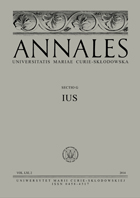Obrona konieczna jako okoliczność wyłączająca bezprawność w prawie karnym Ukrainy
Self-defence as a Circumstance Excluding Illegality in the Criminal Law of Ukraine
Author(s): Yuriy Baulin, Nataliya Lashchuk, Oksana Bronevytska, Taras SozanskyySubject(s): Criminal Law, Criminology, Studies in violence and power, Victimology
Published by: Wydawnictwo Naukowe Uniwersytetu Marii Curie-Sklodowskiej
Summary/Abstract: The institution of self-defence comprises both provisions of the General Part (art. 36 and 37: self defence and imaginary self defence) and the Special Part (art. 118 and 124: intentional killing, causing grievous bodily harm as a result of exceeding the borders of self defence or using excessive measures necessary to catch the perpetrator) of the Criminal Code of Ukraine. There are diverse opinions in Ukrainian jurisprudence concerning the problem of how self-defence and other circumstances eliminate the illegality of a forbidden act. The aim of this paper is to present the main attitudes to these problems. The approach considering self-defence in the light of legality is the most popular view. There is also an approach according to which one distinguishes the prerequisites for self-defence and the elements of such self-defence taking into account elements such as: the subject – the aim – the objective side – the subjective control. The socially harmful attack which justifies the use of self-defence should be analysed using both of these approaches. The features of a legitimate self-defence are: the subject – a private person; the aim – to cause injuries to the attacker (the direct aim) in order to repel or stop the attack (the indirect aim) in order to defend legally protected rights and interests of a person, interests of the society or the state (the final aim); the object – the attacker, his rights and interests; the objective side – actions casually connected with the causing of harm to the attacker, commensurable with the harmfulness of the attack and the state of the defence; subjective control – proper realisation by the subject of the prerequisites and features of the defence and the will to cause commensurable harm to the attacker. Two types of exceeding the borders of self-defence are distinguished in the paper: exceeding the borders of acceptable harm and exceeding the borders of adequate harm. Criminal responsibility for exceeding the borders of self-defence arises only in cases clearly provided for in art. 118 and 124 of the Criminal Code of Ukraine. The sanctions in these articles are much more lenient than in the case of corresponding offences not committed while exceeding of the borders of self-defence (art. 115, 119 and 121 of the Criminal Code of Ukraine).
Journal: Annales Universitatis Mariae Curie-Skłodowska, sectio G – Ius
- Issue Year: 60/2013
- Issue No: 2
- Page Range: 7-27
- Page Count: 21
- Language: Polish

